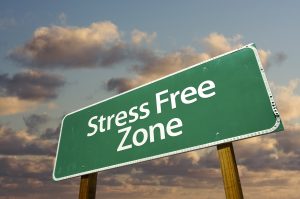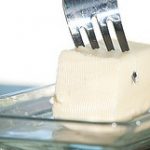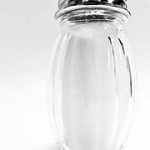“How to eat healthy.”
There are over 300,000 people who search the internet every month for this term. Isn’t that fascinating? People are so confused these days on how to eat a healthy diet, and for good reason.
Depending on who you ask, the definition of a “good” or “healthy” diet will vary wildly. For those of us who believe in the idea of eating “real” food, we think a healthy diet is a real food diet.
Of course, not everyone believes this. There are plenty of people out there still shouting from the rooftops about how terrible butter and bacon and red meat are for you, and how anyone who eats the way us real food folk do would drop dead of a heart attack at any second because of how “unhealthy” our diet is. If you’re reading this blog, I’m sure by now you know that’s complete B.S.
But surprisingly, even in our sphere of real food nutrition followers, there’s a whole-lotta finger-pointing going on as to what should and shouldn’t be eaten. Even when we’re just talking about natural, whole foods!
Plenty of real-food people will just about swear on their lives that even minor consumption of modern wheat will, in fact, kill you. Plenty more will tell you that drinking pasteurized dairy is equivalent to straight-up asking for heart disease, what with that denatured, oxidized cholesterol and all. And then of course, just about every last one of us real foodies will emphatically preach the Anti-Sugar Gospel, singing the praises of raw, local honey and rebuking the blasphemous sins of granulated sucrose.
It’s getting kind of ridiculous. Really, we are way, way over-thinking this stuff.
To me, a healthful diet consists of several principles. Not food groups. Not ideologies. Just a few basic concepts that help to determine what’s truly healthy, and what’s not, without going crazy eliminating 99% of the things normal people eat, from your diet.
Food Rules, Redefined
No, this isn’t going to be much like what you’ve heard regurgitated from a Michael Pollan book in recent years.
“Eat food, mostly plants, not too much,” as simplistic and wholesome as it may sound, is pretty misguided advice, if you ask me. For one thing, plants aren’t always all they’re cracked up to be. (I’m also not real fond of the implication that animal products ought to be avoided.) And advising anyone to “not [eat] too much” food is ambiguous at best (what’s “too much?”), and dangerous at worst (food restriction is never a good idea). Eating should be a joy, and you should eat what your body tells you to eat. You should never tell your body that it’s wrong for wanting to eat anything.
Anyway. That’s a story for another day. Back to the “rules.”
My “food rules” are quite a bit more realistic than what most health gurus out there will push at you. All I care about is making informed choices — being educated about what things are unhealthy (it’s not as big of a list as you might think), what is truly nourishing, how and where our food is produced and how that all affects the sustainability of our food system.
From there, you just do what works for you. You don’t obsess over it, you don’t let your life revolve around healthy eating — you just live like a normal person, and eat. Educated. Be an educated eater. That’s all there is to it.
Here’s the breakdown.
1. Know What You Eat
People in our modern culture are so disconnected from the source of their food that they generally don’t question where it came from, much less whether or not it’s safe. It just comes from… a grocery store, right?
Children these days are often clueless about this stuff because they so rarely actually see a farm during their formative years, but even young adults don’t seem to have even the most basic understanding of food production. A recent survey in the UK showed that more than a third of 16-23-year-old young adults do not know that bacon comes from pigs; four in ten failed to link milk with an image of a dairy cow, and while 67% were able to link eggs to a picture of a hen, 11% thought the eggs came from wheat. You can attempt to pick your jaw up from off the floor now.
Seriously? This is a problem.
But beyond educating our children on the facts of food-bearing life and basic biology, it’s critical that we all take a look at how most of our society as a whole sees the food system. Most people are really living in the dark about this stuff, completely unaware of what exactly goes into the production of what they eat. When you can pull the wool back up over your eyes and realize the truth about what’s out there, you do better. That’s the goal here.
When you learn about what’s in most of the processed foods that make up so many a standard American’s diet, it’s really rather amazing to think about how easily the food manufacturers have managed to gain our collective trust.
Most people only peek at a food label to find out how many calories or grams of fat or sugar it has, instead of questioning what actually makes up the manufactured edible creation. How many chemicals and food additives — many of which have been banned in other countries —are you consuming? How many of those ingredients came from an actual farm, as opposed to a laboratory?
Are there ingredients which have been genetically-engineered to produce pesticidal bacteria, or render the plant they came from infertile? (You won’t find a definitive answer to that, by the way, since the United States is the only developed nation that doesn’t label GMOs.) Are there any naturally-occurring nutrients in it whatsoever, or were only synthetic vitamins and minerals added back in to “fortify” the food?
 Even when it comes to fresh, whole foods, few seem to be truly aware of where the food comes from, what kind of conditions it was produced in, or how it got to them. Did your produce come from a place thousands of miles away, maybe even from another country with unknown regulations for safety? Did it come from a farm that sprays toxic chemical pesticides, herbicides, and fertilizer all over what will become your “healthy” salad?
Even when it comes to fresh, whole foods, few seem to be truly aware of where the food comes from, what kind of conditions it was produced in, or how it got to them. Did your produce come from a place thousands of miles away, maybe even from another country with unknown regulations for safety? Did it come from a farm that sprays toxic chemical pesticides, herbicides, and fertilizer all over what will become your “healthy” salad?
Or the meat, dairy and egg products so widely available. How many are asking what went into the production of those things? Did that juicy steak come from a cow living in a concentrated animal feeding operation, where the animals are sick, drugged, and abused? Was that chicken meat you threw on the barbecue from an animal fed genetically-modified feed, living in horrific conditions and never seeing the light of day, then processed with toxic chemicals before being shipped off to the grocery store?
These are all questions that, sadly, few people are actually asking these days. But asking them, and knowing how to decipher the answers, is key to eating well. I believe it’s very important to be aware of the source of your food, and to avoid perpetuating the dismal, broken, industrialized food system that prevails today.
I know we can’t all buy everything 100% local from certified-organic Farmer Joe down the street, but the basic concept is sound. Be less trusting of food that was prepared far, far away from your eyes. Question what went into its production. Be educated about what you are choosing to eat.
2. Eat Natural Things
Buying things that say “All Natural” on the package, is not a good way to start. Again, food manufacturers really shouldn’t be given that much trust.
Eat more things that come from farms, not factories. Eat things that haven’t been severely altered from their natural state — fresh, whole milk instead of ultra-pasteurized skim, oatmeal instead of oat-flavored “flakes,” real potatoes instead of powdery boxed fluff. Eat things that have been around for a very long time, and meet our “real food” definition.
Eat things that either you made yourself, or could have made yourself — not things with a big block of 50 unrecognizable ingredients on the label. Natural things are good, simple, unadulterated, and well, natural!
What’s not natural? Here’s how I see it:
- Chemical additives, dyes, preservatives, pesticides, flavorings, and other food production enhancers
- Synthetic versions of natural things, like vitamins and minerals
- Industrially-processed seed oils
- Ingredients you can’t pronounce
- Fat-free/ low-fat everything (they will contain heavy amounts of all of the above)
- Meat, dairy, and eggs from animals that were tortured, abused, drugged, and fed a diet inappropriate to their species
- Anything that your great-grandmother wouldn’t recognize as food
I’m sure you get the picture. I hate food restriction, but limiting these sorts of things is kind of a no-brainer for me. This is all stuff that’s really weird, potentially toxic, and just gross. Not things that should be very prevalent in your diet. So, eat more of the good, trustworthy, natural stuff instead.
3. Don’t Stress Over It
Notice how I didn’t say, “Eat ONLY natural things,” or “NEVER eat unnatural things” up there?
That’s because I do not believe in diet perfectionism. Eating a “healthy” diet can actually come with some pretty severe potential side effects when you start trying to do everything right, all the time.
As surprising as it may sound, a healthful diet really can turn into an extremely unhealthful lifestyle. You wouldn’t think focusing on eating a healthy diet could have much of a downside whatsoever — after all, most people look to nutrition to figure out a way of eating that keeps them healthy. But you would be surprised at just how quickly that goal can morph from optimizing your health with what you eat, into a source of chronic, debilitating stress that worsens both your quality of life and your physiological well-being.
There’s a big difference between being passionate about healthy eating, and being obsessive over it.
Idolizing food. Turning your diet into your religion. Letting your diet control you, instead of you taking control of your diet. These are all consequences of putting too much of an emphasis in your life on improving what you eat. And for eating healthy to do you any good whatsoever, you can’t let this happen.
So, this last rule of mine is probably the most important. The other two somewhat fall under the category of common sense, while this one takes much more of a conscious effort to abide by.
 Don’t make the mistake of trying to do all of this perfectly. Don’t ever beat yourself up over making a less-than-ideal food choice. Don’t let yourself continue to strive for higher and higher levels of real food enlightenment — by simply caring enough about what you eat to be reading this blog post, you are already right where you need to be.
Don’t make the mistake of trying to do all of this perfectly. Don’t ever beat yourself up over making a less-than-ideal food choice. Don’t let yourself continue to strive for higher and higher levels of real food enlightenment — by simply caring enough about what you eat to be reading this blog post, you are already right where you need to be.
I find myself saying this more and more these days, but it bears repeating:
It just doesn’t have to be that hard.
Think about that as you read your diet books, food blogs, and the latest tweets and Facebook posts from healthy eating gurus. They do not know you, your body, your needs, and your lifestyle. They don’t understand the resources you have available—your time, money, and energy—to try to meet all these goals of eating the healthiest diet you can.
And they are the ones who have dedicated a good portion of their life to telling others how to eat—that’s going to make their take on the subject biased and unbalanced by default.
That’s not to say that the information out there isn’t valuable. It’s great to read up on this stuff and become informed. But there needs to be a balance struck between becoming educated, and learning how to not let this knowledge backfire on you and cause undue stress. Extremely damaging stress. Health-benefit-negating stress. Stress that even the most perfect, nutritious diet, cannot make up for.
Want to learn more about how to eat healthy, without driving yourself totally nuts?
If you’re looking for more simple, straightforward and common-sense guidance for how to do the healthy eating thing right, but you don’t want to turn into an obsessive nutcase over what you feed yourself, I wrote a whole book about that, and well, I think you’ll probably like it if you found yourself nodding your head while reading this post.
Real Food for Real Life: How to Eat Healthy Without Going Completely Crazy is my anti-guru, anti-diet, pro-food and pro-sanity manual on healthy eating. I wrote it as sort of a normal person’s guide to real food—a “how to eat healthy” for the rest of us.
On sale now—save 25%
Right now, we’re having a special sale on Real Food for Real Life for 25% off. You can check it out here.
What do you think?
How do you define “how to eat healthy?” Leave your thoughts in the comments below.
[disclosure: cmp.ly/4; cmp.ly/5]






I have been following your blog for a while, but wanted to let you know how much I appreciate the articles you post. I recently stopped following a lot of other real-food/paleo/WAPF bloggers because I was getting so stressed out with all of their “everything you’re eating/doing is going to kill you” articles. I love your realistic approach and really appreciate you keeping this lifestyle low-stress. Thank you!
I believe in eating mostly plants too — but it should not be gluten containing plants like wheat. And avoiding processed food is another important rule.
You think a rule to avoid “everything” that’s processed is necessary? Even coconut oil is processed.
You just gained a lifetime follower and new purchaser of your book. All I can say is thank you..if you could see me now, the tears of happiness running down my face would be enough said. Thank you <3
Well now I’M crying!! Vanesa. I cannot thank you enough for your support. It means SO much to me. Big virtual hugs. 🙂
Hello, just wanted to mention, I enjoyed this post.
It was inspiring. Keep on posting!
I came across your website today because it was mentioned in a post where others were arguing over whether or not something was considered “real food”. I just have to say that this post was so very refreshing as I’ve been battling over the whole food thing for about a year now. What to eat, what not to eat. This is bad for you, oh wait, now it’s good for you. It’s insane how much back and forth there is. I really love your food philosophy and I’m going to show this to my husband who will be so thankful. My poor family has been bearing the brunt of my confused “health nut” self for far too long. I think as of today I’m going to pledge to do the best that I can for my situation and stop stressing over it. Can’t wait to read the rest of your site!!
when I first went to the supermarket after beginning this journey I literally came home crying!! I didn’t feel like i could buy anything! It has improved since then – I hardly shop in the supermarkets anymore – intead the local farms! thank you for being so easy to understand and just so real! I pass on your blog info to anyone who is interested in real food… it is by far the best one to follow – please keep up the good work 🙂
Oh girl, can we be best friends?!
Seriously. I’ve been at this baby-making thing for almost five years, have been through the wringer with meds and procedures and an awkward amount of time in the stirrups with my girly bits on display. The one thing no one ever said to me was to get my diet in order…
Recently, I started seeing an acupuncturist/TCM fertility specialist, and he has a background in nutrition. He’s been basically telling me everything you wrote here for the past few months, on top of “you’re far too thin, you need to gain weight; I don’t care if you never have before, you will DO IT”.
I’m so happy to find a resource where I can feel okay about not being perfect all the time, and where it’s okay to be cold and skinny and barren, but working on it by feeding myself ALL THE GOOD THINGS and trying every day to raise that body temp one tenth of a degree.
Anyway, sorry for the novel… fellow blogger here. Hah. I just wanted to say THANK YOU THANK YOU THANK YOU!! 😀
There are three (3) things I don’t like with your blog. So here comes some criticism for you.
Firstly, you tell people not to eat agave since it’s a highly processed substance, but you say that it’s completely fine to eat chocolate and oreos now and then. Last time I checked those are pretty high processed substances.
Secondly, you like food that is as close to its natural state as possible, and give seed oil as an example of food not to eat, since the seeds don’t magically turn themselves into oil. But to be honest cow milk doesn’t turns itself to cheese or yoghurt either…?
I get the impression that you just like to speak against all other piece of health advice out there, and myth bust your way to fame, just for the sake of doing so.
Thirdly you act like you are here to tell people the “truth” and “only the truth”. Some modesty could really be useful.
1. I don’t give a crap what kind of sugar you eat.
2. I don’t recommend seed oil because it’s filled with high amounts of damaging, rancid polyunsaturated fatty acids.
3. I like truth. I’ve been wrong about a lot of things. I like to learn so I can know more truths. And write about them.
That’s pretty much it. Glad you think I’m famous. That made me giggle!
I totally agree with everything you’ve said here. (Except for the fact that a lot of what you said actually DOES fall in line with Michael Pollan’s book).
I agree that eating shouldn’t be complicated, and that we should be informed about what we are putting into our bodies. If we truly care about ourselves, we should only want to put the best foods into ourselves. But caring for yourself also means letting yourself have a little fun once in a while too, and not stressing about things. I would say I’m eating about 90% real food these days. Growing my own veggies, getting meat and eggs from my parents’ farm, buying locally grown organic produce to supplement what I can’t grow myself, and being ingredient-conscious while reading food labels at the store. I’m also preparing a lot of my own foods at home which brings a whole other realm of satisfaction to the mix.
However, I still enjoy a good dinner out a restaurant with friends here and there. And if I’m at someone’s house and they are cooking dinner for me, or serving some kind of treat/appetizer, I won’t stay away from it just because I can’t be sure of all the ingredients they’ve used. These times, these foods, and most especially the company of the people I’m eating with are nourishing for the soul and I think they are important.
I really like how you’ve spelled it all out here. Thank you.